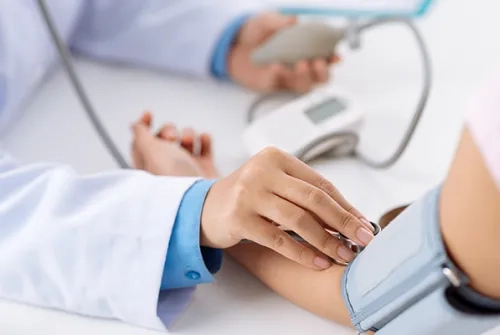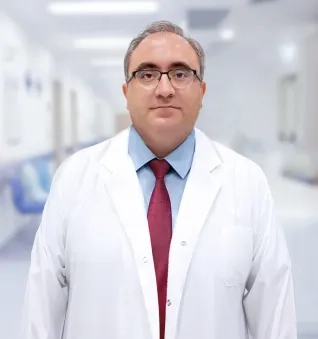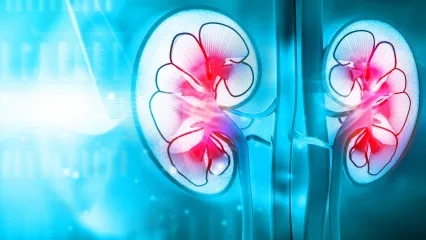Alo Yeditepe
Alo Yeditepe
What is Hypertension?
What is Hypertension?
Hypertension is the most common disease in the world, which also affects one out of every three people in our country. Hypertension ranks first among the preventable causes of death in the world.
Compared to people with normal blood pressure, people with untreated hypertension are at twice the risk of death, three times the risk of heart disease, and seven times the risk of stroke. One of the most critical target organs of hypertension is the kidneys. Even 15% of patients with no kidney disease but only high blood pressure are lost due to kidney failure if not treated. Many people with hypertension may not have any complaints. Even if it does not cause any complaints, it continues to cause damage to the heart, kidneys, eyes, and veins. For this reason, it is also necessary to measure blood pressure once a year in people with no complaints and treat it if it is detected as high.
In preventing and treating hypertension, attention should be paid to dietary salt restriction as much as medications.
In adults, values of 130/80 mmHg and above in measurements made at home and 140/90 mmHg and above in measurements at the doctor's office are considered hypertension. In addition, values between 130 and 140 for systolic blood pressure and between 80 and 90 for diastolic blood pressure are considered a predisposition to hypertension. Hypertension has genetic origins in most cases. The fact that some genetic factors reduce salt excretion through kidneys and increase salt and water retention in the body constitutes one of the most important causes of hypertension. Hypertension is not a heart disease but a critical and widely prevalent disease that damages the heart, kidneys, veins, eyes, and brain when not treated correctly and on time.
Genetic causes, obesity, malnutrition, excessive smoking, sedentary lifestyle, and stress increase the likelihood of developing a type of hypertension called essential hypertension, which occurs in 95% of hypertension patients, and the cause of which is unclear. Only 5% of the patients have an underlying disease that causes hypertension, and this type of hypertension is called secondary hypertension. This type of hypertension is caused by renal and endocrine diseases and some medications the most.
The Genetic Nature Of Hypertension
Essential Hypertension is principally genetically transmitted, but modifiable factors dependent on our volition, which are called environmental factors, also cause hypertension. In the presence of hypertension in the family, especially in parents and siblings, these people should monitor their blood values and beware of other factors that increase the risk of heart disease, such as being overweight, having a sedentary lifestyle, smoking, and consuming alcohol or salt.
Changes in Blood Pressure During the Day
Blood pressure may vary throughout the day depending on a person's physical activity and emotional state. It is at its lowest level during sleep at night, begins to increase when the individual wakes up in the morning and reaches its highest level at noon. It increases during work and decreases during rest. In hypertension cases whose blood pressure does not decrease at night have a higher risk of heart disease, kidney failure, and cerebral palsy. For this reason, blood pressure should be monitored at night with devices that monitor blood pressure 24 hours a day, and hypertension medications should be planned accordingly.
Symptoms of Hypertension
Many people with hypertension may not have any complaints. Even if uncontrolled high blood pressure does not cause any complaints, it continues to cause damage to the heart, kidneys, and veins. For this reason, blood pressure should be measured once a year in people with no complaints, too, and treated if detected as high. Some patients may have the following symptoms: dizziness, headache (usually in the back of the head and in the neck), rapid fatigue, shortness of breath, visual disturbances, chest pain, nosebleeds, tinnitus, palpitations, and a feeling of heaviness in the head. Since these symptoms can also be observed in other patients, they are not specific to hypertension.
Hypertension at all levels, regardless of whether the damage done by hypertension to the organs causes a complaint or not, causes significant problems if it is not treated.
Compared to people with normal blood pressure, people with untreated hypertension are at twice the risk of death, three times the risk of heart disease, and seven times the risk of stroke.
Actions To Be Taken in the Treatment of Hypertension Other Than the Use of Medication
In treating hypertension, recommendations that we call “lifestyle changes” are vital to reduce blood pressure to the desired level, either alone or as an aid to drug therapy. Lifestyle changes:
- Have a proper and balanced diet
- Exercise for 45-60 minutes 4-5 times a week
- Get down to your ideal weight and maintain this weight
- Restrict alcohol consumption
- Reduce salt (do not consume ready-made food, canned food, pickles, nuts, and tomato paste)
- Do not smoke
There is a strong relationship between salt intake and hypertension. Hypertension is more common in societies that consume too much salt. Salt restriction reduces blood pressure at all hypertension levels, can normalize blood pressure in mild hypertension, and causes a decrease in the amount of medication used in severe hypertension. The point that should not be forgotten here is that canned, processed, and frozen foods contain much more salt than the recommended daily intake, which is 6 grams. It should be kept in mind that prepared foods can be a hidden source of salt.
Medication in Hypertension
Essential Hypertension is a disease of genetic origin and lasts a lifetime. Then the treatment also continues for a lifetime. Hypertension treatment is planned specifically for the individual and initiated by the relevant specialist physicians after the patients are warned about the medication's effects and side effects. The fact that you start drug therapy when deemed necessary by your doctor will protect your body from the possible damage caused by hypertension. If the medications have been prescribed upon thoroughly investigating the causes of hypertension, they will not harm your kidneys; in fact, they will be protective. But if treatment is prescribed without investigating the cause of hypertension and is not regularly followed by a doctor, both medications and hypertension itself can damage the kidneys.
Some Medications Cause Hypertension
Analgesics, flu medications, and some psychiatric medications can cause hypertension. Moreover, some hypertension medications also can disrupt the heart rhythm when used together. If you suffer from hypertension, do not take any medications without asking your doctor, who follows you up.The duration of action of each hypertension medication is different, and sometimes it is potentially harmful to take them at the same time. Use your medications only in the way and at the time recommended by your doctor.
Make sure that you regularly measure your blood pressure or have it measured. Record your measurement results. Show the data you have recorded to your doctor on every visit.
This content was prepared by Yeditepe University Hospitals Medical Editorial Board.
”
See Also
- What is Hypoglycemia?
- Common Misconceptions About Kidney Transplantation
- Kidney Diseases and Treatment Methods
- What is Obesity? Obesity Symptoms, Diagnosis and Treatment
- 10 Questions About Kidney Transplantation
- How Should the Daily Salt Consumption Amount Be?
- Dealing Ways with Overtemps
- 8 Causes of Sweating
- Dehydration can Lead to Forgetfulness in the Elderly
- Did You Know That Our Bodies are Managed by Hormones?
- Sweating May Be a Sign of Illness
- What is HCT (Hematocrit)?
- Misconceptions About Hypertension
- Chronic Kidney Disease and Treatment Methods
- Latent Diabetes (Prediabetes)
- Chronic Pelvic Pain
- What is Polycystic Ovary Syndrome/PCOS?
- Things Wondered About Kidney Transplantation and Organ Donation
- An Infection that Does Not Recover is a Precursor of Diabetes
- If You Consume More Than 5 grams of Salt...
- The Frequency of Hepatitis Seen in Dialysis Patients Is Decreasing
- 12-Year-Old Tuğba Nur Survived with Transplant
- The Hidden Problem Seen in One out of Every 10 Women: HIRSUTISM
- Persistent Headache May Be a Sign of Tumor
- Excess Protein Does Not Increase Muscle Mass, and It Impairs the Kidneys
- The Purpose of Pituitary Diseases is to Avoid Waste of Time with the Right Treatment
- Pelvic Floor Muscles Should Be Addressed with a Multidisciplinary Approach
- Protect Children From Sports That Will Knock Their Head
- AV FISTULA Should Be Done At The Right Time For Hemodialysis Patients
- Pay Attention to Kidneys in Pregnancy!
- He Held On To Life with His Brother's Kidney
- 'Exercise Vaccine' Recommendation for Chronic Fatigue
- Taking a Leave Is as Useful as Quitting Smoking
- Eating Calories In The Morning Saves Lives
- The Warrior That Protects Our Immune System: Vitamin D
- The Immune System and Sleep Are Sending Messages to Each Other for A Healthy Life
- Eye, Kidney, and Heart Enemy: Hypertension
- Polycystic Ovary Syndrome Can Occur If the Bacteria in the Gut Are Not Functioning Well
- Recommendations to Strengthen the Immune System
- Kidney Failure Caused by Ear Obstruction
- There is Still a Lot of Misconception About Organ Donation
- Vitamin D May Be the Cause of Your Fatigue
- Benefits of Antioxidant
- He Lost 20 Kilograms in 40 Days for His Wife
- Doctor Support for the Ban on Heading by Children
- One Out of Every Seven People Has Kidney Disease
- Start the New Year Healthy
- How Should Kidney Patients Be Protected From COVID-19 Coronavirus?
- What is Propolis? How to Use Propolis?
- Multivitamin is Not a Panacea
- Improper Nutrition Invites Kidney Failure
- Important Warning from the Expert: “Not Adding Salt to Meals Alone Is Not Enough”
- Head Trauma Can Cause Permanent Damage
- Do I Have Covid or Influenza?
- What is Acromegaly Disease?
- The Amount of Nutrients Needed for Satiety Decreases as Eating Time Increases!
- Health Problems Triggered After Recovery from Covid
- Check-ups Following the Vacations!
- Methods to Deal with Bad Cholesterol
- Are Your Kidneys Really Healthy?
- Not Every Sore Throat Is Caused by an Infection!
- Being Thirsty in the Heat Tires the Kidneys!
- Why Is Vitamin D Deficiency So Common in Türkiye?
- Tissue Harmony Is Also Important for Success in Kidney Transplant
- Aspirin Used Without Physician's Advice Increases Risk of Bleeding!
- Do Not Unconsciously Turn to Herbal Products to Get Rid of Winter Fatigue
- Diabetes Mellitus and its Treatment
- Check Up for Females Over 40
- Check Up for Females Under 40
- Check Up for Females Over 50
- Check Up for Males Under 40
- Check Up for Males Over 40
- Check Up for Males Over 50
- Cardiology Check-Up
- Child Check Up Package
- Psychologist Package
- Dietitian Package
- Treatment of Pituitary Adenomas
- Surgical Treatment of Pituitary Diseases
- Pituitary Clinic | FAQs
- Phytotherapy and Immune System
- Check Up Packs
- Healthy Aging Course
- Comprehensive Geriatric Assessment
- How to Drink Water: Warm, Cold, or Hot?
- Why Are the Elderly at Risk for Coronavirus?
- Symptoms of Vitamin D Deficiency
- What are Pituitary Diseases?
- What is the Pituitary Gland, What are its Functions?
- What is Hirsutism?
- Hirsutism Clinic / FAQs
- Treatment Success in Brain Tumors Also Depends on the Family
- Hereditary Kidney Diseases Are Underrecognized!
- Misconceptions about Cholesterol!
Alo Yeditepe









